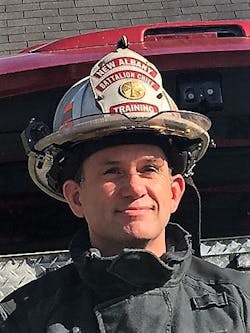I’ve had a wonderful career in the fire service, and I’ve been blessed to work in more than one fire department, both military and civilian, giving me a wide range of experiences and opportunities. With such varied experience, I’ve heard the statement, “That’s not how we do it here” more than I like to remember. I will concede that not everything translates from department to department, but some core values and ideas should. One of those is the performance appraisal.
Barometer for success
Performance appraisals are a great way to get a firefighter on the page as everyone else by giving them the opportunity to know what they‘re doing well, where they can improve, and most importantly, what expectations their officer has for them in the coming months. This should be a formal event between an officer and his firefighters, one at a time. This is valuable for the firefighter and their company, and it can be priceless to the department and community.
When a supervisor sits down with their firefighter to review past performance and set new goals, it becomes a valuable tool to improve performance, morale and the department as a whole. It has been my experience that firefighters like to know how their work is being perceived and where they should go next. A performance review isn’t a pat on the back or an attack. It is an objective look at a firefighter’s work habits and progress since the last review.
In some departments, performance reviews are commonplace. Reviews are provided frequently to new recruits, and then as an annual process for the career firefighter. Some reviews are detailed and lengthy; others are more precise and to the point. Either way, firefighters gain valuable information that pertains directly to their career path.
Sadly, in some departments, there is no review process. Firefighters have no barometer for success or failure, only what they might overhear other firefighters share while gossiping around the breakfast table over coffee. Though this may be common in some departments, it’s no way to evaluate or promote people.
An established performance review helps to narrow the promotional subjectivity gap by using standardized performance metrics. When a promotion comes up and the performance review process is in place, a firefighter’s work ethic and progress can be quantified, which can go a long way in helping to determine whether a promotion is in order.
When creating a performance appraisal process, there’s no need to reinvent the wheel. Find a department locally or abroad that already has one established. Contact them and find out what their growing pains were and plan to avoid those pitfalls. Of course, each department needs to personalize its performance review to meet its own needs. However, getting assistance from a department that already has a process in place will save headaches, roadblocks and time. In addition, I’d strongly encourage using Human Resources and the local union as legal resources when moving to implement a new process. This can keep the department from wasting time going down the wrong path.
Appraisal components
When finalizing the structure of the appraisal process, there should be at least four basic elements:
- Job description: Review the firefighter’s duties and responsibilities, and discuss any areas of confusion or concern.
- Current expectations: Review the jobs and tasks the firefighter is expected to perform.
- Completion: Review how well the firefighter completed the expected tasks.
- Future expectations: Determine what is expected by the next review. For example, it might be recommended that a new recruit get more time setting up the aerial truck. Or a veteran firefighter might need to take a class in modern behavior and building construction.
With each element, the system can be made more specific with regard to the firefighter’s assignment and/or years of service. For example, a truck firefighter may need different review criteria than an engine firefighter. Years in service should also be considered in the grading system. A new recruit can’t be expected to have as much knowledge and responsibilities as a veteran firefighter.
When the company officer finishes a review, the firefighter should be given the opportunity to add comments.
Up the chain
After a company officer completes their performance review of their firefighters, the review should immediately go up to the battalion chief for review. This part of the process can serve as a check and balance for a company officer who may try to skew a performance review favorably for his company.
To be legitimate, any appraisal process must be as fair and objective as possible, and must be used on a continuous cycle. Firefighters should know from the day they start work that everything they do, from the fireground to the firehouse, is subject to evaluation on the next performance review.
Further, the upper echelon should consider a 360 evaluation. This is where the chief and maybe his or her immediate staff is evaluated by the officers below them. In most departments this would be the staff or a staff designee evaluating the chief of the department and maybe his or her deputy chief. This will not only offer the head of the department some insight on their progress and process but also show the rank and file the transparency and unity a department needs.
In sum
All in all, firefighters need and deserve to know where they stand in the organization and where they’re headed. Likewise, departments need tools to develop and retain current and future talent. A performance appraisal system can support both. By reviewing performance in a formal and regular process, firefighters receive the tools they need to set and achieve their personal and professional goals, and departments have access to a roadmap to leverage the talent of the future.
About the Author

Jake Barnes
Jake Barnes is a battalion chief of training for New Albany, IN, Fire Department. He has over 20 years in the career service, including with the U.S. Air Force and the Lexington, KY, Fire Department. Barnes has an associate’s degree in general studies and is currently finishing his bachelor’s degree in fire protection administration.
